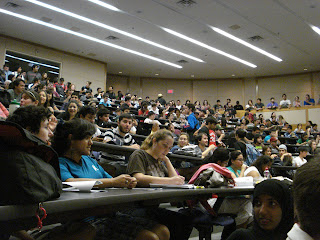This is the tenth anniversary of
HESTEC. HESTEC is a campus and community event, and the name is an acronym for “Hispanic Engineering, Science, and Technology.” I was involved again this year in organizing the Science Symposium on day 1, where we were fortunate to have the biggest “name” speaker we’ve ever had.
Steve Niemeyer (
Texas Commission on Environmental Quality) talked about his particular path into a scientific career. His three big pieces of advice: Work hard. Learn how to communicate. And don't quit (it took him 7½ years to complete his bachelor’s degree). Niemeyer gave his talk without slides, incidentally.
Jose Bravo, a lead scientist at Shell Oil, was the second speaker, talking about efforts to develop new energy sources. There were two one liners that I appreciated.
“There is a misconception that innovation is an instant,” he said, citing the common “lightbulb” image that is used to signify a flash of inspiration. Bravo stressed the long time needed to develop ideas alll the way through to the final working industrial-level product.
Bravo also talked about how, as he moved through his career, his job transitioned from providing answers to asking questions. He said that at Shell, “
People with answers always work for people with questions.” I think that is a great line, and very true for all sorts of organizations, including academia. Grad students and post-docs have the answers. They work for people who ask the questions. (Dr. Karl is very fond of saying, “It’s not the answer that gets you the Nobel prize; it’s asking the right question.”
I was disappointed – though perhaps not surprised – that in answering one question, he washed his hands on whether climate change was happening or not. He said that Shell saw reducing its carbon output as simply good business. But for any scientist to be speaking in a prominent public forum and to pussyfoot around the reality of human climate change, and the effects of continued unrelenting burning of fossil fuels is irresponsible.
I thought about pressing hm on that, but decided against it, to give students the opportunity to ask questions.
The room continued filling up through the symposium...
One student seemed to have wandered out of ComicCon.
Bill Nye arrived to lots of cheers and applause, and palpable excitement.
Nye gave a talk laced with his trademark humour, touching on many topics, such as the changes in society and science that had happened through the lifetimes of his immediate family. Similar to Jose Bravo, energy was very much on the mind of Nye. “I want one of you to go into the solar hot water business! Will one of you do that?!” In response to a student’s question, he later talked about how he cut his electric bill to $10 for two months in summertime.
During the questions, Nye also talked about his new role as executive director of the
Planetary Society. He asked people to estimate how many people have now flow in space, and most underestimated the number: it’s now over 500! He noted that space exploration is no longer the
Star Trek ideal of boldly going where no one has gone before.
“Now it’s, ‘To timidly go where 538 have gone before.’”
He challenged students to develop materials that would make lighter rockets and space travel more feasible, because, “I want to go someplace new and cool.” Nye was also quite bullish on the prospects of finding fossil microbes on Mars, which he proposed be called “Marscrobes” (if they exist!).
A student also asked if Nye still got to do original research, or if he was just doing television and education. Nye replied that he continued to use his engineering skills every day in his job in the Planetary Society, saying, “Scientific skills allow you to evaluate if someone’s crazy.”
Nye said much more besides, and we could have gone another hour. But it was great to see the enthusiasm people had for him. You cannot underestimate the impact that people on television, like Nye, have on the imaginations of people.
In the afternoon, I moderated a career roundtable with my colleague,
Robin Fuchs-Young and Heather Reddick. It went quite well, and was again better attended than it had been in previous years.
After that, I walked back into the lobby and watched some of the posters fall from their frames. Some frames had corkboard mounted on metal, and I guess the adhesive on the cork was getting old... I could see several of them sagging before they gave up and snapped.

















